
Construction materials company Vulcan Materials (NYSE: VMC) met Wall Street’s revenue expectations in Q3 CY2024, but sales fell 8.3% year on year to $2.00 billion. Its non-GAAP profit of $2.22 per share was 4.1% below analysts’ consensus estimates.
Is now the time to buy Vulcan Materials? Find out by accessing our full research report, it’s free.
Vulcan Materials (VMC) Q3 CY2024 Highlights:
- Revenue: $2.00 billion vs analyst estimates of $2.02 billion (in line)
- Adjusted EPS: $2.22 vs analyst expectations of $2.31 (4.1% miss)
- EBITDA: $581 million vs analyst estimates of $584.2 million (small miss)
- EBITDA guidance for the full year is $2 billion at the midpoint, lowered and below analyst estimates of $2.03 billion
- Gross Margin (GAAP): 28.2%, up from 27% in the same quarter last year
- Operating Margin: 16.8%, down from 19.2% in the same quarter last year
- EBITDA Margin: 29%, up from 27.6% in the same quarter last year
- Free Cash Flow Margin: 24.9%, up from 10.8% in the same quarter last year
- Tons Shipped: 57.7 million, down 6.2 million year on year
- Market Capitalization: $34.28 billion
Tom Hill, Vulcan Materials' Chairman and Chief Executive Officer, said, "Results and activities in the third quarter evidence the consistent execution of our two-pronged strategy to generate durable growth. We continue to enhance our core through expansion of our industry-leading aggregates cash gross profit per ton, which increased 10 percent in the third quarter and has grown by double-digits for eight consecutive quarters. We also recently announced the acquisition of Wake Stone Corporation, a leading pure-play aggregates producer, that will expand our reach in high-growth geographies in the Carolinas. Our Vulcan Way of Selling and Vulcan Way of Operating disciplines remain fundamental to compounding profitability across our franchise and successfully integrating new operations. "
Company Overview
Founded in 1909, Vulcan Materials (NYSE: VMC) is a producer of construction aggregates, primarily crushed stone, sand, and gravel.
Building Materials
Traditionally, building materials companies have built competitive advantages with economies of scale, brand recognition, and strong relationships with builders and contractors. More recently, advances to address labor availability and job site productivity have spurred innovation. Additionally, companies in the space that can produce more energy-efficient materials have opportunities to take share. However, these companies are at the whim of construction volumes, which tend to be cyclical and can be impacted heavily by economic factors such as interest rates. Additionally, the costs of raw materials can be driven by a myriad of worldwide factors and greatly influence the profitability of building materials companies.
Sales Growth
Reviewing a company’s long-term performance can reveal insights into its business quality. Any business can have short-term success, but a top-tier one sustains growth for years. Thankfully, Vulcan Materials’s 8.9% annualized revenue growth over the last five years was decent. This is a useful starting point for our analysis.
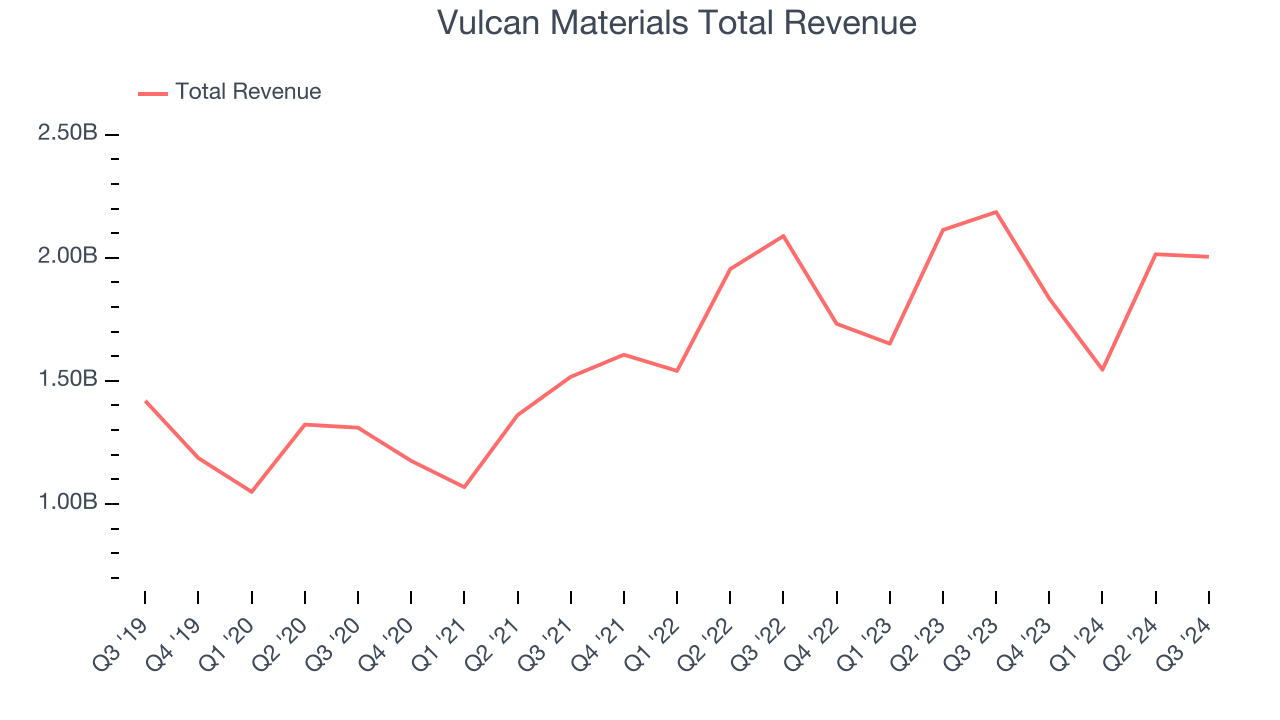
Long-term growth is the most important, but within industrials, a half-decade historical view may miss new industry trends or demand cycles. Vulcan Materials’s recent history shows its demand slowed as its annualized revenue growth of 1.4% over the last two years is below its five-year trend. 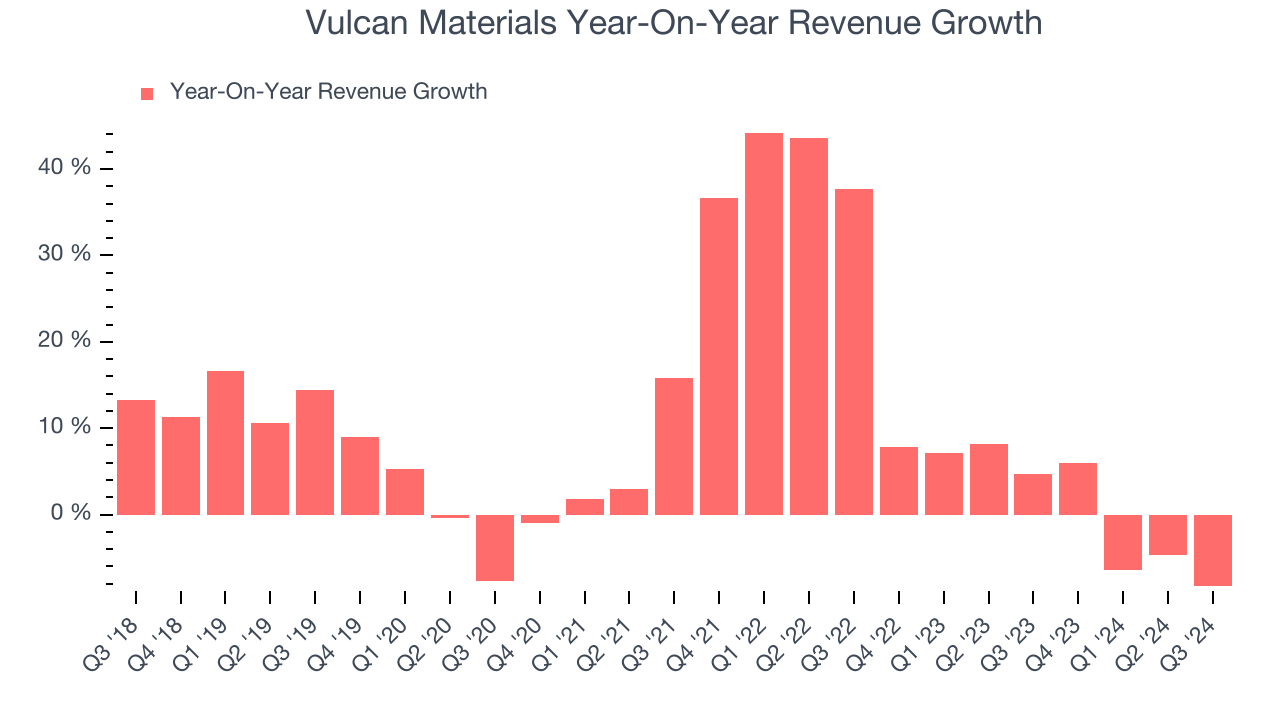
We can better understand the company’s revenue dynamics by analyzing its number of tons shipped, which reached 57.7 million in the latest quarter. Over the last two years, Vulcan Materials’s tons shipped averaged 3.9% year-on-year declines. Because this number is lower than its revenue growth during the same period, we can see the company’s monetization has risen. 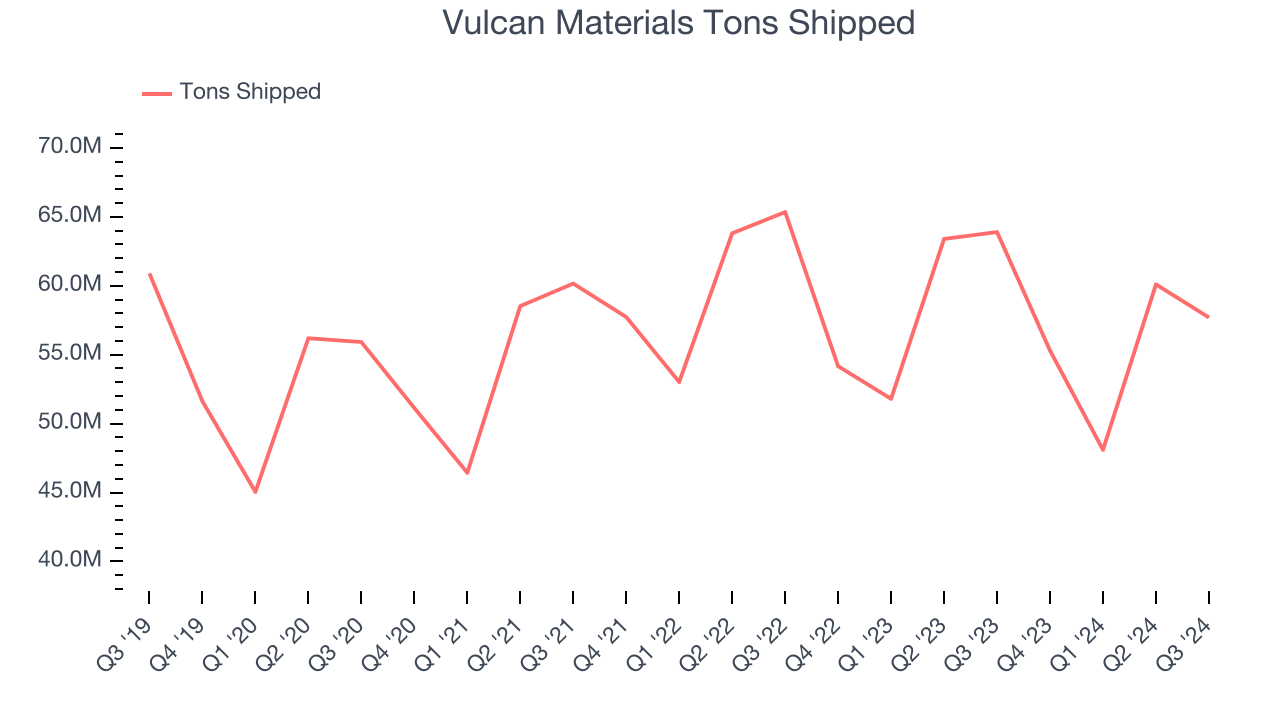
This quarter, Vulcan Materials reported a rather uninspiring 8.3% year-on-year revenue decline to $2.00 billion of revenue, in line with Wall Street’s estimates.
Looking ahead, sell-side analysts expect revenue to grow 5.6% over the next 12 months. While this projection illustrates the market thinks its newer products and services will fuel better performance, it is still below average for the sector.
Today’s young investors won’t have read the timeless lessons in Gorilla Game: Picking Winners In High Technology because it was written more than 20 years ago when Microsoft and Apple were first establishing their supremacy. But if we apply the same principles, then enterprise software stocks leveraging their own generative AI capabilities may well be the Gorillas of the future. So, in that spirit, we are excited to present our Special Free Report on a profitable, fast-growing enterprise software stock that is already riding the automation wave and looking to catch the generative AI next.
Operating Margin
Vulcan Materials has been a well-oiled machine over the last five years. It demonstrated elite profitability for an industrials business, boasting an average operating margin of 16.9%. This result was particularly impressive because of its low gross margin, which is mostly a factor of what it sells and takes huge shifts to move meaningfully. Companies have more control over their operating margins, and it’s a show of well-managed operations if they’re high when gross margins are low.
Looking at the trend in its profitability, Vulcan Materials’s annual operating margin might have seen some fluctuations but has generally stayed the same over the last five years, highlighting the long-term consistency of its business.
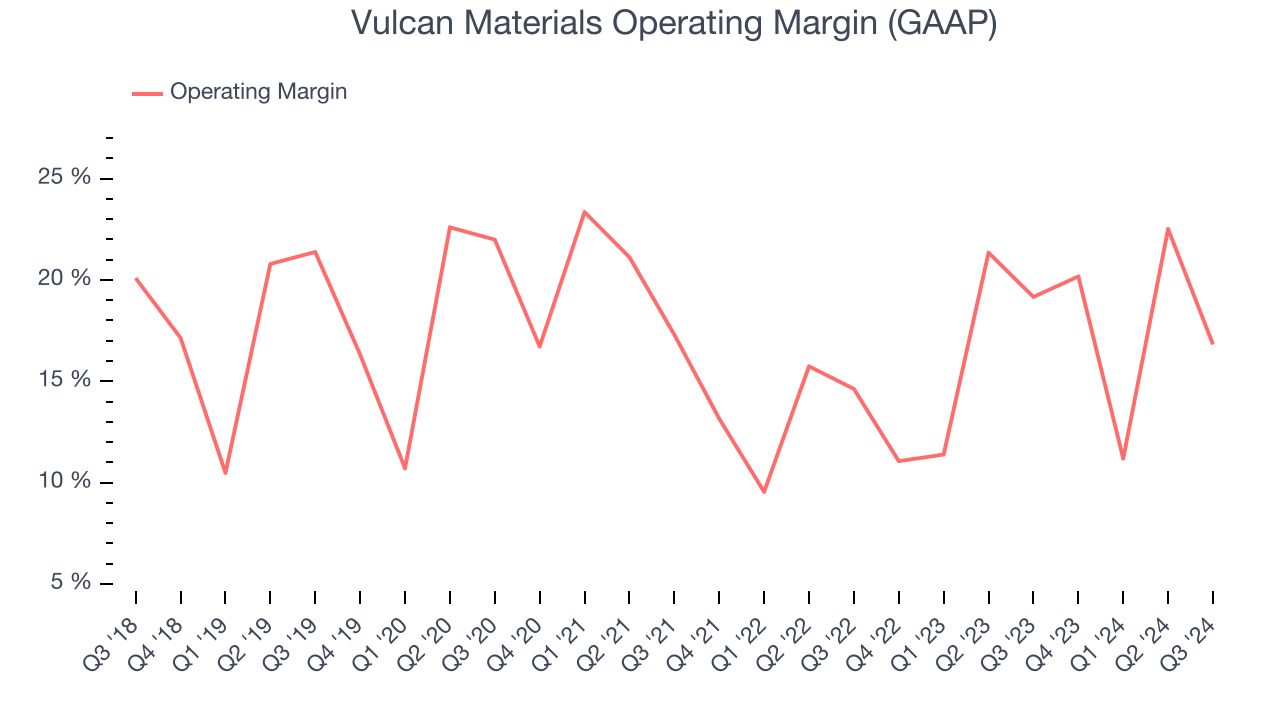
In Q3, Vulcan Materials generated an operating profit margin of 16.8%, down 2.3 percentage points year on year. Conversely, its gross margin actually rose, so we can assume its recent inefficiencies were driven by increased operating expenses like marketing, R&D, and administrative overhead.
Earnings Per Share
Analyzing revenue trends tells us about a company’s historical growth, but the long-term change in its earnings per share (EPS) points to the profitability of that growth – for example, a company could inflate its sales through excessive spending on advertising and promotions.
Vulcan Materials’s decent 8.2% annual EPS growth over the last five years aligns with its revenue performance. This tells us it maintained its per-share profitability as it expanded.
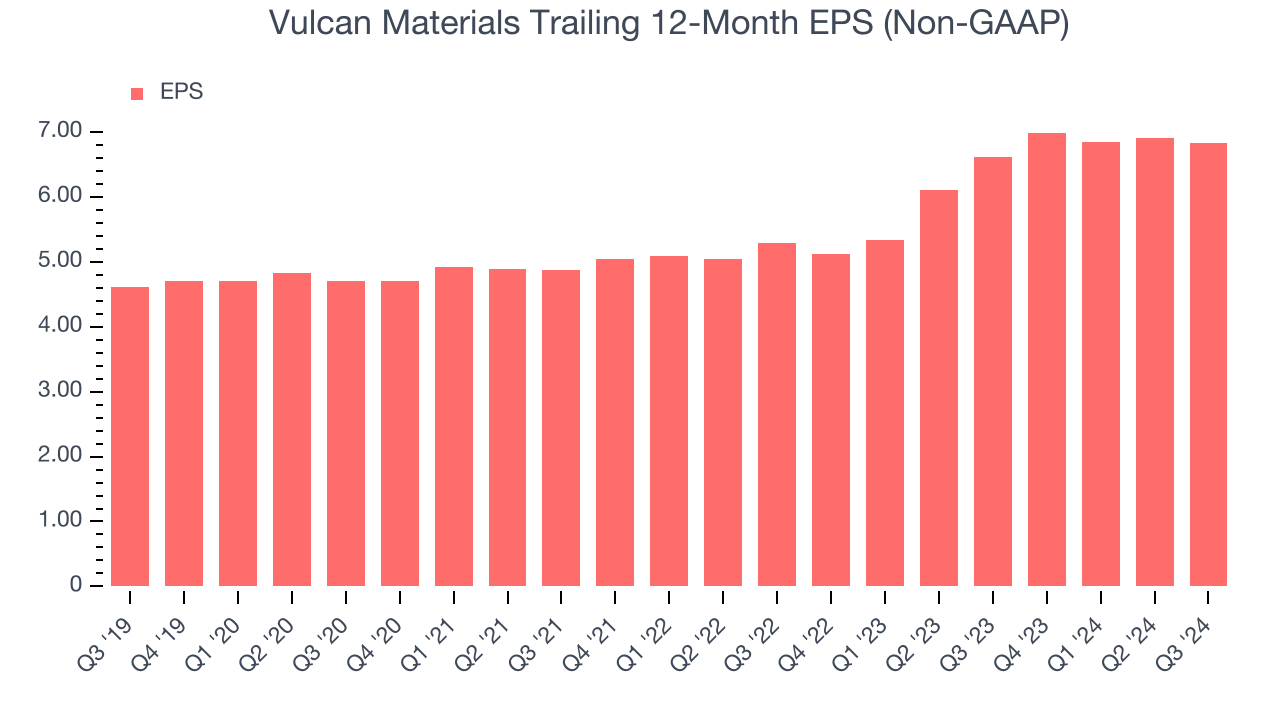
Like with revenue, we analyze EPS over a more recent period because it can give insight into an emerging theme or development for the business.
Vulcan Materials’s two-year annual EPS growth of 13.6% was great and topped its 1.4% two-year revenue growth.In Q3, Vulcan Materials reported EPS at $2.22, down from $2.29 in the same quarter last year. This print missed analysts’ estimates, but we care more about long-term EPS growth than short-term movements. Over the next 12 months, Wall Street expects Vulcan Materials’s full-year EPS of $6.83 to grow by 26.2%.
Key Takeaways from Vulcan Materials’s Q3 Results
We struggled to find many strong positives in these results. Its EPS missed and its EBITDA guidance for the full year fell short of Wall Street’s estimates. Overall, this was a weaker quarter. Perhaps expectations were low because the stock traded up 2% to $264.58 immediately following the results.
Should you buy the stock or not?We think that the latest quarter is only one piece of the longer-term business quality puzzle. Quality, when combined with valuation, can help determine if the stock is a buy. We cover that in our actionable full research report which you can read here, it’s free.






